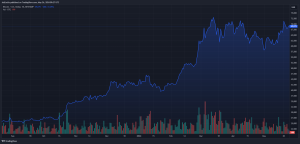In a recent examination of the changing crypto scene, Bitcoin proponent Samson Mow has voiced doubts about lawmakers’ growing support for digital assets. Mow warns that this brief shift could lead to problems down the road if people start to mistake Bitcoin’s and other cryptocurrencies’ essential features.
Inability To Tell Bitcoin From Other Cryptocurrencies
Many lawmakers need help distinguishing Bitcoin from other currencies, which is one of Mow’s main worries. He stresses that Bitcoin is distinct from many different digital currency projects that can have various features and risk profiles due to its decentralized, permissionless, and censorship-resistant nature.
I’m not bullish on politicians becoming pro “crypto.” It may feel nice given the prior hostile anti-crypto stances, but long term it’s bad for #Bitcoin. Without a strong Bitcoin ethos, this shift only paves the way for the next FTX/Luna/Genesis, & once again, we will pay for it. https://t.co/bXd9ymjkZY
— Samson Mow (@Excellion) May 25, 2024
Essentially, he suggests that combining them all under the general term “crypto” may result in ill-informed legal frameworks and policy decisions that ignore Bitcoin’s unique characteristics.
The Need for Regulations Particular to Bitcoin
Mow emphasizes the significance of creating laws tailored to Bitcoin that consider its special qualities and advantages. He contends that approaching Bitcoin in the same way as other cryptocurrencies may discourage creativity and impede the development of this game-changing technology.

As Mow recently noted, Bitcoin is not just “another cryptocurrency.” According to him, this new monetary system can completely alter how we see money and finance. Rules must be specifically designed to address Bitcoin’s unique features to maintain its responsible and sustainable growth.
Good Things Happening And The Obstacles To Come
Notwithstanding his reservations, Mow notes that there have been encouraging advancements in the Bitcoin space, including the rising acceptance of the currency by institutional investors and the growing backing of certain legislators. He does, however, warn that difficulties are ahead, especially with regard to consumer protection and regulatory clarity.
Some commentators contend that safeguarding consumers and promoting innovation must coexist in harmony. As the regulatory environment is still changing, legislators must adopt a deliberate and informed stance to secure the long-term viability of Bitcoin and the larger ecosystem.
Samson Mow’s analysis emphasizes the difficulties and complications connected to the growing political interest in cryptocurrency. By highlighting the need to distinguish Bitcoin from other cryptocurrencies, Mow hopes to encourage educated policy choices and rules that facilitate this revolutionary technology’s sensible development and uptake.

























